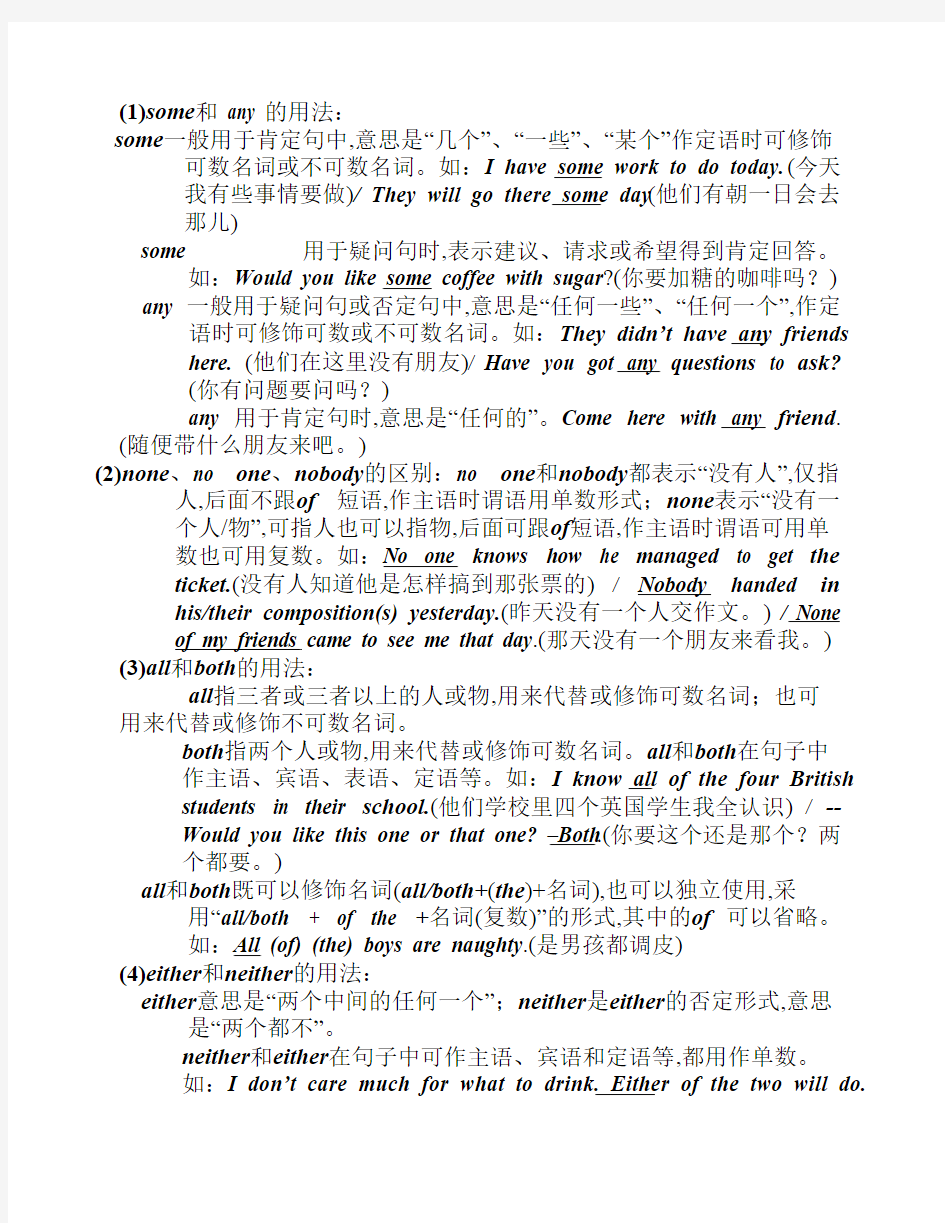
不定代词---词组
- 格式:pdf
- 大小:220.85 KB
- 文档页数:5


(1)some和 any 的用法:
some一般用于肯定句中,意思是“几个”、“一些”、“某个”作定语时可修饰可数名词或不可数名词。如:I have some work to do today. (今天
我有些事情要做)/ They will go there some day.(他们有朝一日会去
那儿)
some 用于疑问句时,表示建议、请求或希望得到肯定回答。
如:Would you like some coffee with sugar?(你要加糖的咖啡吗?) any 一般用于疑问句或否定句中,意思是“任何一些”、“任何一个”,作定语时可修饰可数或不可数名词。如:They didn’t have any friends
here. (他们在这里没有朋友)/ Have you got any questions to ask?
(你有问题要问吗?)
any 用于肯定句时,意思是“任何的”。Come here with any friend. (随便带什么朋友来吧。)
(2)none、no one、nobody的区别:no one和nobody都表示“没有人”,仅指
人,后面不跟of短语,作主语时谓语用单数形式;none表示“没有一
个人/物”,可指人也可以指物,后面可跟of短语,作主语时谓语可用单
数也可用复数。如:No one knows how he managed to get the
ticket.(没有人知道他是怎样搞到那张票的)/ Nobody handed in
his/their composition(s) yesterday.(昨天没有一个人交作文。) / None
of my friends came to see me that day.(那天没有一个朋友来看我。)
(3)all和both的用法:
all指三者或三者以上的人或物,用来代替或修饰可数名词;也可用来代替或修饰不可数名词。
both指两个人或物,用来代替或修饰可数名词。all和both在句子中
作主语、宾语、表语、定语等。如:I know all of the four British
students in their school.(他们学校里四个英国学生我全认识)/ --
Would you like this one or that one? –Both.(你要这个还是那个?两
个都要。)
all和both既可以修饰名词(all/both+(the)+名词),也可以独立使用,采用“all/both + of the +名词(复数)”的形式,其中的of可以省略。
如:All (of) (the) boys are naughty.(是男孩都调皮)
(4)either和neither的用法:
either意思是“两个中间的任何一个”;neither是either的否定形式,意思是“两个都不”。
neither和either在句子中可作主语、宾语和定语等,都用作单数。
如:I don’t care much for what to drink. Either of the two will do.
(我不介意喝些什么,两个之中随便哪个都行)/ --Will you go there by bus or by car? –Neither. I will go there by train.(你坐公车去还是坐轿车去?一个都不坐,我坐火车去。)
(5)many和much的用法:
many意思是“很多”,与可数名词复数连用;much意思是“很多”,与
不可数名词连用。它们在句中可作主语、宾语和定语等。如:I
don’t have many friends here.(在这里我没有很多的朋友。)/Many died in the bus accident.(许多人在公交车祸中丧失) / We can learn much with the help of him.(在他的帮助之下我们能学到很多)
many和much一般用于否定句,肯定句中通常用a lot of或者lots of;
many / much用于肯定句时可以在前面加上so、very或too.如:
There are a lot of people on the playground.(操场上有许多的人)/ They haven’t got much work to do.(他们没有多少事情可做) / There are too many people in the room.(房间里人太多了。)
(6)few、little、a few、a little的用法:
few、little意思是“很少几个”、“几乎没有”,有否定的意思,a
few、a little意思是“有几个”、“有些”,有肯定的意思;few、a few 与可数名词连用或代替可数的事物,little、a little与不可数名词连用或代替不可数的事物。它们在句中可作主语、宾语和定语。
如:
He is very poor and he has little money.(他很穷,几乎没有什么钱。) / Don’t worry. There is still a little time left.(别着急,还有一点儿时间呢。) / In that polar region there live few people.(在那个极地地区几乎不住人) / You can get a few sweets from him.(你可以从他那儿弄到一些糖果)
(7)other、the other和another的用法:
other意思是“另一”、“另一些”,有复数形式。在句子中可作主语、
宾语和定语。another意思是“另外”、“又一个”,表示增加,在句中可作宾语和定语。如:
Some girls are singing under the big apple tree and others are sitting on the grass talking.(有些女孩在大苹果树下唱歌,别的就躺在草地上说话) / You have had several cakes. Do you really want another one?(你已经吃了好几块饼子了,你真的还要一块?)/ I want another four books.(我还要四本书)
another(另外的,再一,又一)与the other(另外的一个) 主要从数量上区分,只有两个时用the other,在原先基础上增加用another。如: